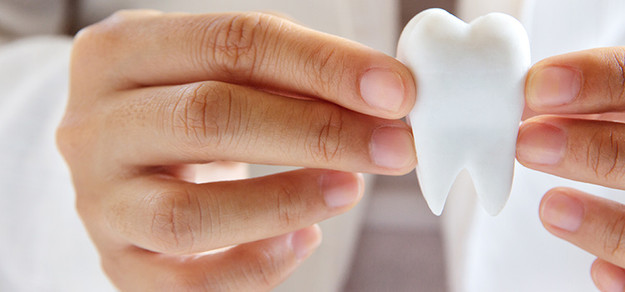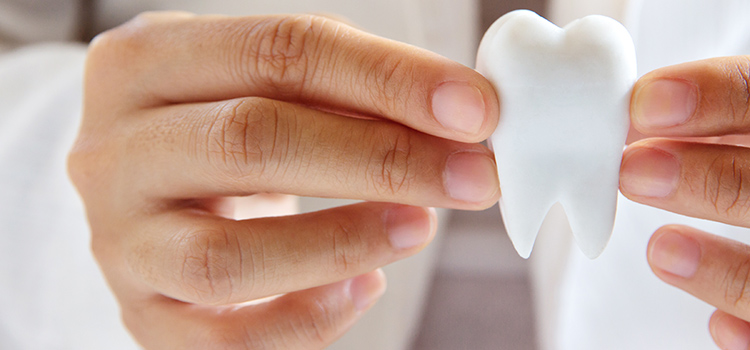Oral Thrush From Night Guards
27th Mar 2022

Bruxism is often accompanied by worries about cracked or broken teeth and aching jaws. Unfortunately, oral thrush from night guards is another concern. This infection causes white spots on the inside of the mouth that can cause discomfort and soreness. If you use a mouthguard for teeth grinding, you may wonder if this device is linked to oral thrush. While mouthguards are a great treatment option for bruxism, they must be properly cleaned to avoid bacteria buildup. Fortunately, there are many effective cleaning methods that will keep your mouthguard fresh.

Can Using a Night Guard Increase Your Risk of Oral Thrush?
According to Mayo Clinic, oral thrush, more formally known as oral candidiasis, happens because an overgrowth of yeast causes a fungal infection. The organism, Candida albicans, occurs naturally in the mouth, and it's normally kept in check by good bacteria that also reside there. When the balance falters, the yeast overgrows and causes raised yellow-white patches throughout the inside of the mouth. The patches may be tender, and they may bleed. Depending on the severity of your case, your mouth may feel cottony or like it's burning.
Using a night guard doesn't mean that you're destined to develop oral thrush from night guards. However, if you are not diligent about cleaning your device, you may be at higher risk of bacterial growth. Yeasts, fungi, and bacteria can grow on mouthguards if they aren't cleaned properly because they thrive in damp environments. Good hygiene is important. Neglecting the maintenance of your mouthguard can increase your chances of developing cavities, gum disease, dry mouth, oral thrush from night guards and a variety of other illnesses from bacteria buildup.

How Can You Avoid Oral Thrush While Using a Mouthguard?
If you want to avoid oral thrush, bad breath, cavities, gum disease, and other health problems, there's a simple solution. Make cleaning your mouthguard a regular part of your oral care routine. This will keep it from becoming a breeding ground for bacteria and other biological health threats.
Daily cleaning of an acrylic night guard is straightforward. Rinse the appliance in warm water each morning. Don't use boiling water. This might cause it to lose its shape. Allow it to dry before storing it in a clean case.
Every two weeks, complete a deep cleaning of your mouthguard. You'll have several methods to choose from:
- Toothpaste: Select a nonabrasive toothpaste and a toothbrush that is used solely for this purpose. Gently scrub the mouthguard. Then, rinse it with cold water.
- Baking soda: Mix a small measure of baking soda and water to create a paste. Take a toothbrush, and softly scrub the night guard. Finish by rinsing the night guard with cold water.
- Mouthwash: Fill a container that's large enough to hold the mouthguard with a solution of water and alcohol-free mouthwash. Soak the appliance for 30 minutes. Then, rinse it fully.
- Hydrogen peroxide: Place the night guard in a container. Fill it with hydrogen peroxide. Allow the night guard to soak for 10 minutes or so. Be sure to rinse thoroughly.
- Denture cleaning solution: Products vary, so follow the directions on the package. If you don't, then you may experience unpleasant side effects or damage to your mouthguard. After cleaning, take care to rinse the device fully.
Do not use bleach to clean your night guard. It may damage the appliance. If your night guard is damaged, worn out, or moldy, it's time to discontinue use and replace it.
Do make it a point to clean your night guard's case. After all, storing a clean night guard in a dirty case will quickly undo all your efforts. At a minimum, the case should be cleaned when you deep clean your night guard. In addition, it's wise to clean it if you drop it, you've been sick, or you suspect it would benefit from a cleaning.
Related Articles:

What Are Other Causes of Oral Thrush?
Anything that disturbs the balance of Candida albicans and healthy bacteria in the mouth can trigger a bout of oral thrush. As Healthline reports, a weakened immune system is a common culprit. That explains why oral thrush often strikes infants and the elderly, who tend to have weaker immune systems. Some medications, such as antibiotics, have been known to increase the chances of oral thrush as well. Cancer patients are also at risk because treatments like chemotherapy and radiation suppress their immune response.
Some medical conditions also diminish the immune response, leaving the body more vulnerable to infections like oral thrush. Leukemia and HIV both increase a person's chance of experiencing thrush. Diabetes is a common cause of oral thrush because it weakens the immune response and increases blood sugar.
Anyone who wears a mouthguard or splint needs to practice good oral hygiene and dental care. When you are taking medications or have a medical condition that makes you more susceptible to an oral or bacterial infection, being diligent about your oral care is extra important.
Mouthguards and Teeth Grinding
For people with conditions like bruxism, TMJ disorder, or sleep apnea, night guards can provide amazing relief. Mouthguards can prevent tooth decay, jaw pain, and more. These user-friendly devices are highly effective, but they do require regular cleanings. Without that basic care, they can become a breeding ground for germs that can make users sick. Fortunately, caring for a night guard is simple.
Are you searching for a new custom-fitted mouthguard for bruxism? Check out the selection at Pro Teeth Guard. We offer top-quality mouthguards online for an affordable price. Our night guards are made in a professional dental lab using professional materials and processes. This is effectively the mouthguard you’d receive from a dentist.
References:
- Giorgi, A. (2019). Everything you need to know about oral thrush. Healthline. https://www.healthline.com/health/thrush#diagnosis
- Mayo Clinic Writing Staff. (2017). Bruxism (teeth grinding). Mayo Clinic. https://www.mayoclinic.org/diseases-conditions/bruxism/symptoms-causes/syc-20356095

- Most Popular
- Hard Outside, Soft Inside
- 2MM Thick
- Moderate / Heavy

- Most Durable
- Hard Materials
- 1.5MM Thick
- Heavy / Severe

- For Day Time Use
- Thin, Barely Visible
- 1MM Thick
- Light / Moderate

- For Clenching
- Flexible & Soft
- 1.5MM Thick
- Light / Moderate

